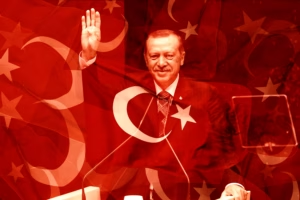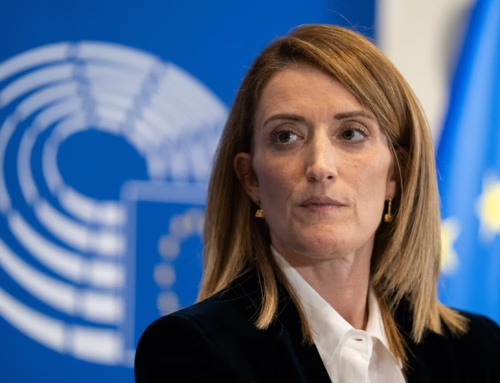Israel prepares for aggression from Turkey
Israel must prepare for a potential war with Turkey, warned the Nagel Committee, which advises the Israeli government on defense budget and security strategy decisions.
Turkey played a crucial role in the rise of former al-Qaeda leader Abu Mohammed al-Golani to power in Syria.

The threat from Turkey via Syria could develop into something even more dangerous than the Iranian threat, according to a new Israeli report. Photo: Pickpik
The committee warned that Turkey’s ambitions to restore the influence of the Ottoman Empire could lead to increased tensions with Israel, which could potentially escalate into conflict.
Israel must prepare for a direct confrontation with Turkey, according to a report on defense budget and security strategy, reported the Jerusalem Post in early January.
The report highlights the risk of Syrian factions aligning with Turkey, creating a new and serious threat to Israel’s security.
“The threat from Syria could evolve into something even more dangerous than the Iranian threat,” the report noted, warning that Turkish-backed forces could act as proxies and fuel regional instability.
The committee’s assessment comes amid Turkish President Recep Tayyip Erdogan’s increasingly aggressive rhetoric and power-play in the region.
The Nagel committee submitted its recommendations to Prime Minister Benjamin Netanyahu, outlining a comprehensive strategy for dealing with new threats.
The committee proposed increasing the defense budget by up to 45 billion kronor annually over the next five years to ensure that the Israel Defense Forces (IDF) is equipped to deal with the challenges posed by Turkey, along with other regional threats.
Commenting on the report, Netanyahu said: “We are witnessing fundamental changes in the Middle East. Iran has long been our greatest threat, but new powers are entering the arena and we must be prepared for the unexpected. This report gives us a roadmap to secure Israel’s future,” writes the Jerusalem Post.
Seeking a new relationship
The foreign ministers of Germany and France said they wished to forge a new relationship with Syria and called for a peaceful transition when they met with Syria’s new leader Ahmed al-Sharaa, formerly known as Abu Mohammed al-Golani, in Damascus, early January, on behalf of the European Union.
During the visit, Syria’s new leader greeted only the male French foreign minister, but refused to greet the female German foreign minister.
Western governments have gradually begun to open up contacts with the Sunni Muslim group formerly affiliated with al-Qaeda and the Islamic State, and have also begun discussing whether to remove the group’s terrorist designation.
However, up to now, the West has not lifted sanctions on Syria under al-Assad or remove the terrorist designation from al-Golani’s organization, Hayat Tahrir al-Sham (HTS), although the United States recently canceled a $10 million reward it had previously offered for information about al-Golani.
Senior American diplomats who visited Damascus just before Christmas met with Syria’s new leader and then decided to remove the reward.
Western leaders also initially saw Syria’s former president Bashar al-Assad, – accused of genocide -as a positive force in the Middle East. In 2002, he visited Britain, invited by Queen Elizabeth and the then future King Charles.
Wants to liberate the Levant
Al-Golani’s organization Hayat Tahrir al-Sham means “Organization for the Liberation of the Levant” where “al-Sham” is the Arabic term for Greater Syria (sometimes also translated as the Levant), which historically refers to the area that includes the modern countries of Syria, Lebanon, Israel, Jordan, Cyprus and parts of Turkey. The name can therefore be seen as a claim to larger areas outside of Syria.
Following Assad’s fall, Israel has moved into a demilitarized zone in Syria established after the 1973 Arab-Israeli War, including a strategic post on Mount Hermon overlooking Damascus. Israel says the move is temporary, to ensure border security while it carries out attacks on Syria’s strategic weapons depots. Several Arab nations, including Saudi Arabia, the United Arab Emirates and Jordan, condemned Israel’s actions.
Turkey strongly condemned Israel’s military presence in the buffer zone between Israel and Syria. The Turkish Foreign Ministry accused Israel of displaying an “occupational mentality” and warned of further incursions. Turkish President Erdogan, who has himself occupied large parts of northeastern Syria since 2016, stressed support for Syria’s territorial integrity and vowed to act against any threats to the country’s sovereignty.
Established a safe zone
Abu Mohammed al-Golani also complained to the UN that Israel had established a safe zone to protect against future attacks by the new rulers in Syria, despite the fact that al-Golani himself – with the help of Turkey – had for years occupied nearly 9,000 square kilometers (which corresponds to more than a third of Israel’s area) of northeastern Syria, which made the conquest of Syria possible.
It was in practice Turkey’s long-standing occupation of northeastern Syria that made the conquest of Syria by the former al-Qaeda fighters possible.
Another prerequisite was that Turkey, Russia and Iran deliberately let al-Assad fall from power through direct and indirect support for the jihadists with a background in al-Qaeda. On the same day that Assad fell, the foreign ministers of Russia, Turkey and Iran met in Qatar to coordinate their response-actions.
In mid-December, al-Golani also criticized Israel for “unjustified escalation” after Israel’s airstrikes in Syria, a large-scale operation against over 350 sites across the country to neutralize Assad’s military assets so that they would not fall into the hands of the new regime.
In mid-December, former Syrian President Bashar al-Assad claimed that he never intentionally fled to Russia. In a post on Telegram, Assad claimed that he only left the capital on December 8 to meet with Russian forces in Latakia province “to monitor combat operations” as Syrian rebels stormed Damascus. In the midst of the attack, Assad wrote, he was forced to evacuate along with Russian troops, who took him to Moscow. This incident confirms the close coordination that existed between Turkey, Russia and Iran.



